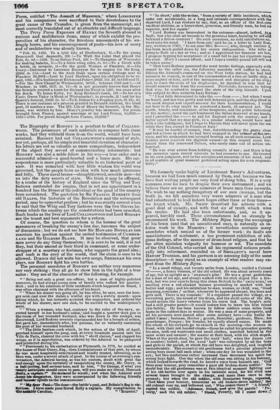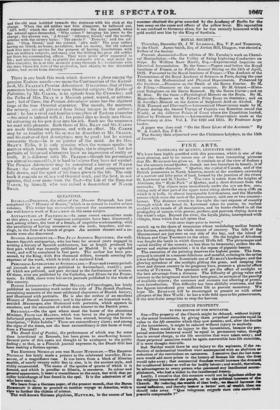We formerly spoke highly of Lieutenant SHIPP'S Adventures, because we
had been much amused by them, and because we be- lieve that writing people are very fond of doing folks. It is a very common case for men to despise their own instrument ; and we believe there are no :greater admirers of brave men than cowards. We wish to say nothing derogatory of our own courage, but the truth is, we felt ourselves very warm admirers of a man who had volunteered to lead forlorn hopes either three or four times— we forget which. Mr. SHIPP described his actions with a good dal of vivacity, and with that air of truth which wins the reader. He had also been unfortunate, and, as it ap- peared, harshly used. These circumstances led us strongly to recommend his work. The Military Bijou being the sweepings of his brain (and that an uncultivated one), is naturally an in- ferior work to the Memoirs : it nevertheless contains many anecdotes which remind us of the former work: its faults are mawkishness of sentiment, a too prominent exhibition of reli- gious feelings, after the manner of drum-head religion, and that he too often mistakes vulgarity for humour or wit. The anecdote of the Old Colonel, who carried all his regimental notions practi- cally into retirement, reminded us of SMOLLETT'S naval hero Hawser Trunnion. and his garrison is an amusing folly of the same description—it may stand as an example of what readers may ex- pect from the Military Bijou.
"In a small village, not twenty miles from London, resided a Colonel W—, a hoary veteran, of the old school. He was about seventy years of age, but as upright as a • sergeant's pike.' He was a great pedestrian for a man of his age, and always walked with his stick sloped like a fire- lock, but was ever sure to bring this sham firelock to the carryarms,' on meeting even a red-cloaked woman proceeding to market with her butter and eggs ; and his salutation to man, woman, or child, was, Good morning,comrades ;' so that, whenever he appeared abroad, the boys and girls said, • There is my comrade.' If a regiment passed the village, or a recruiting party, the sound of the drum, and the shrill notes of the fife, would arouse the hoary veteran from his warm bed. The bugle's note had a still greater power—it would induce him to leave his best friend (his bottle). He has been known to follow soldiers some miles from home in the coldest days in winter. He was a man of some property, and all his servants were named after some military hero :—his butler he called Cmsar ; footman, Hector, groom, Hannibal; gardener, Mars; his gamekeeper, Pompey; his females, by equally absurd names. He made the whole of his servants go to church in the morning—the women in front, with their red-hooded cloaks—those he called his grenadier guards; his-men, -with red waistcoats and small-clothes, marched behind in the same order and manner ; the master at their-head, with his stick sloped. When at the porch-door, he gave the word halt,' when the dames (six in number) halted ; and the word halt' was reiterated by all the boys -and girls in the parish, at which the old hero was delighted, and laughed immoderately. This eccentric old gentleman had a peculiar pleasure in -seeing boys snow-ball each other ; when one day he was wounded in the eye ; but this misfortune rather increased than decreased his spirit for seeing boys fight. One day when the old man was sitting in his balcony, which lookedtowards the road, he heard a voice from beneath say, • GOJI bless your honour, pray remember a poor add broken-down soldier.' No doubt but the old-gentleman was-at this identical- moment felting one of his Old battles over again in his imbecile mind, for his stick was several times brought to the charge, and more than once to the present; but when the old soldier, with Stentorian lungs) repeated, 'God bless your honour, remember an old broken-down soldier,' the old colonel rose up, and bellowed out, 'Who comes there?' • A friend,' replied the soldier. 6-Advance, frienk-and -give the parole.' 'Po- verty,' said the, old, seldier, & Stand, Poverty) till I come down f.,° and the old man hobbled -towards - the staircase with his stick at the charge. When the old soldier saw him disappear, he bellowed out,
' well,' Which the old colonel repeated : the door opened, when the colonel again demanded, Who comes ?' bringing his piece to the charge ; the answer was, A friend." Advance, friend,' said the worthy veteran with the silvery locks : The parole?' ' Poverty,' said the sol - dier. I Stop, friend,' said the colonel, all's well.' The poor soldier having no friend, no home, no relative, and no money, the old colonel took him into his service for the purpose of having dissertations with him on military subjects, and many was the drilling the poor old soldier got from his commanding officer. They were never after separated in life ; and who knows but, to gratify the colonel's whim, and make his bliss complete, he is at this moment going through les evolutions with the man whom his love of the profession, and charity to the discarded soldier, had saved from starving ?"























 Previous page
Previous page